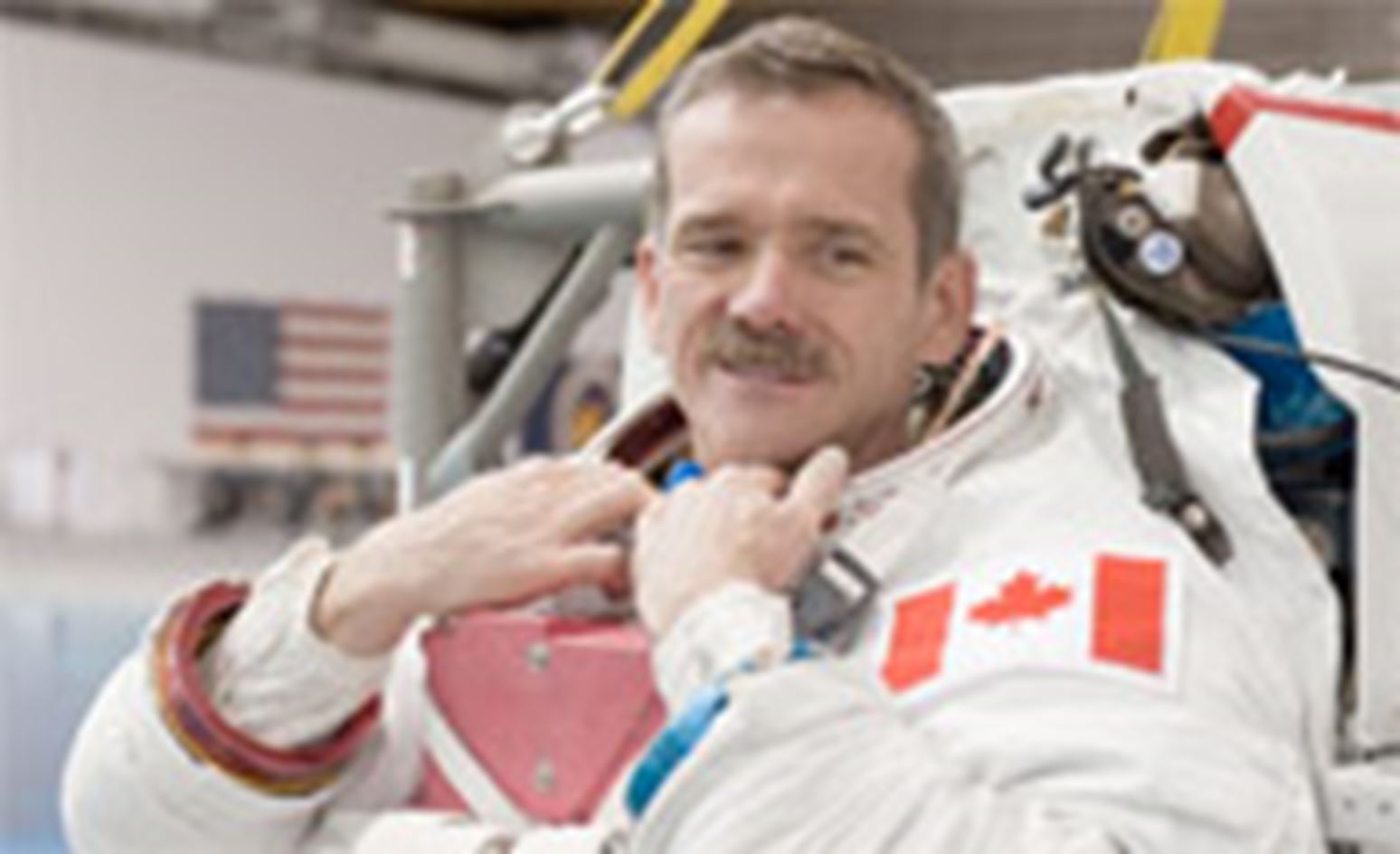Commander Chris Hadfield is a science fiction hero come to life.
One of my favourite Science Fiction authors, Robert Heinlein, always writes his male heroes with the same general stats- extraordinarily smart, handy, manly men, who are also romantic and passionate. Total swashbucklers. No wonder then that like Lazarus Long, I find the Commander captivating. He's got the smarts of an engineer, the fearlessness of a test pilot (*ahem* Woodrow Wilson Smith?), and the creative passion of a rock star. If, like me, you followed the different accounts that Chris's son ran for him back on Earth, you saw his photos and videos and songs chronicling his time living on the ISS. But what you may not have had a chance to learn about is Cmdr Hadfield's vision of leadership.
I was very fortunate to have the chance to listen to the Commander speak at the Ivey Business School's 90th anniversary event. I learned fabulous details about space travel- did you know the space shuttle operates on 128k of memory???-and also got schooled in crisis leadership.
On Thursday, May 9 2013, the astronauts aboard the International Space Station discovered an ammonia leak. Ammonia is used to cool the ISS and is vital to its operation. Usually, it takes at least 9 days to schedule a spacewalk. When the leak was discovered, the Soyuz capsule containing Commander Hadfield and two of his crew were due to descend to earth, leaving behind one astronaut on his own. This one man would then be stranded, awaiting his new crew, hoping the ammonia supply would hold out. The Commander said that, of course, there was absolutely no doubt- it had to be fixed before the Soyuz would depart for Earth.
Chris contacted Mission Control back on Earth, explained the situation, and immediately started to prepare his team for the spacewalk. On May 11th, two of the ISS crew performed a six hour spacewalk and, under the guidance of the Commander, fixed the issue.
As Cmdr Hadfield told us this tale, he took the time to explicitly share with us his vision of leadership. Three lines in particular resonated with me.
Build a base of common competence
The Commander assembled his crew YEARS before they launched. NASA announced in 2010 that he would be leading Expedition 35 in December of 2012 and Chris started working closely with his team at that point. He began to spend time with the crew, individually and in group settings. He got to know them well, their professional abilities and their personal attributes, and also encouraged them to get to know each other.
Chris believes that the role of a leader is to step back and let his team shine. To do this, each member of the team must have complete faith in the abilities of the rest. By exploring the various expertise of his crew, the Commander focused on the strengths of the individuals to create a solid foundation of trust- between each member of the future ISS crew, within the team as a whole, and between each member and himself as well. This trust and understanding built a base of common competence that allowed his team to have complete confidence in each other when things got hairy...which of course they did.
If someone is going 89 degrees differently than you, you're still going in the same direction
I. Love. This. I love the math geekery of it all, but also what it says about Chris's style of leadership.
Surprise, surprise, this again comes down to TRUST. A strong leader clearly communicates the vision and goal of the mission. Commander Hadfield had two goals for his crew aboard the ISS- for all of them to return alive, and for each member of his team to immediately say "let's go again!" like a kid at an amusement park.
Chris kept those two overarching goals in mind, and shared them with his crew. All he asked of his team is that their activities lead towards the same place- building an environment of safety and excitement.
Cmdr Hadfield didn't get hung up on the path that each member took, as long as they were heading in the same direction. He provided complete freedom and latitude for his crew to choose their own way to contribute to the goals of the mission, as long as ultimately the work was contributing towards their overall success. Chris believes individuals must have the time and space (hah!) to pursue their passions freely, because a leader must become an autocrat when a crisis does arrive...and they always do...
When your surge inevitably comes, your team has to have enough left to react
You mean to say DON'T grind your team down day to day so that come crisis time they have the energy and drive to react? Now ain't THAT something!
We've all had those jobs. The ones where nothing is ever enough. You give give give and try try try and they always want MORE. You work extra hours and pour in energy yet it is never enough. When the inevitable happens, when the products don't ship or the website crashes or the space station starts leaking vital ammonia out into space, you are already tapped out with no reserves left to draw upon. That is when people give up, and teams collapse.
By allowing his crew the latitude to work on the projects they wished how they wished, as long as they kept the team goals in mind, Cmdr Hadfield didn't deplete their energy reserves with needless conflict. By showing his team that he trusted them as the qualified professionals they were, Chris built a culture of mutual trust and respect. When disaster struck, the Commander stepped in and took control, his team ready and willing to follow his command. Within 48 hours, Chris worked with his crew on the ISS and the Earth bound team to successfully lead 2 astronauts on a 6 hour spacewalk to fix the broken space station. What normally took days of planning was accomplished in hours. Now that, my friends, is crisis leadership.
As he did every morning, the day before the spacewalk amidst furious planning and preparations, Commander Hadfield greeted us with "Good Morning, Earth!" About to embark upon a truly record breaking expedition, this was his tone. His mood. His frame of mind. His trust of his team, and theirs of him. Far from cracking under the pressure, Chris's tweet shows his calm confidence under extreme pressure, just like science fiction heroes always do. Thank you for your service and leadership, Commander.

This post originally ran on Spin Sucks.
 About the Author
About the Author
Equal parts thinker, tinkerer, science geek, and marketer/sales pro, Rebecca can be found traveling the world as a rep for Ivey Publishing. In her spare time she's also a vinyl junkie, drinker of fine drinks, and voracious reader. Google+ TwitterLinkedIn Blog
